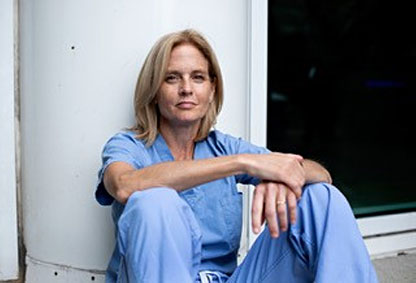Physician mental health has been a hot topic for the last several years, entering the spotlight on the heels of the COVID-19 pandemic, which triggered global concerns around the well-being of frontline workers. Viral photos of exhausted, distressed healthcare staff took center stage. Many were lost to suicide and the conversation about how best to support these groups has only gained momentum since.
Many healthcare organizations, including Massachusetts General Hospital and Mass General Brigham, have long studied staff well-being trends and have implemented programs and services to improve it. And yet, despite data proving the prevalence of mental health issues such as depression, substance use disorders and suicidality in the healthcare field, few seek help for fear of job loss and retribution and few are willing to be the “face” of the problem.
Carrie Cunningham, MD, MPH, associate professor of surgery and section head of the Endocrine Surgery Program at Mass General, is here to change that by using her personal battle with depression, post-traumatic stress disorder and story of recovery from alcohol use disorder to fight the stigma.
“I am also human.”
In 2023, Dr. Cunningham gave the Association for Academic Surgery Presidential Address during the annual Academic Surgical Congress. Wiping away tears, she started her emotional speech by rattling off her impressive accomplishments, including competing at Wimbledon five times as a world-class tennis player and being the recipient of a coveted RO1 grant from the National Institutes of Health for her research. She ended the list, saying, “I am also human. I am a person with lifelong depression, anxiety and, now, with substance use disorder. None of my professional successes have protected me against this. I am not special.”
The 50-minute speech, titled “Removing the Mask,” has garnered more than 65,000 views on YouTube. During it, Dr. Cunningham is raw, direct and honest — but in a comforting, assuring manner that anyone would want their surgeon to have. She does not temper her obvious vulnerability or minimize the risk she is taking by sharing her lived experience; instead, she recognizes early on in her talk that offering this part of her story “will change [her] career path” forward.
She says, “There will be jobs that I am not offered. There will be doubts as to my abilities. There will be people who see me as weak, emotional and damaged.”
An Activist is Born
It seems the opposite has happened, however. Since the viral address, Dr. Cunningham has become the embodiment of how to harness one’s personal experiences to create real change.
“When I went to my second treatment center, I was mainly surrounded by other professional colleagues — other surgeons and doctors — so it was easy to relate to one another and truly unroof the problem,” says Dr. Cunningham during a follow-up interview. “It was shocking to grasp that the suicide rate of our profession was double that of the general population, and that only a quarter of us seek help because of fear.”

Dr. Cunningham expanded this new understanding by surveying Academic Surgical Congress meeting attendees leading up to her speech. Of the 625 surgeons who responded, one in 10 had experienced suicidal ideation in the last two weeks alone, and approximately 60% knew a colleague who had died by suicide. To paint a stark picture, she says that “625 is comparable to the average size of a medical school class,” meaning if these numbers reflect all medical school classes, then more than 60 students of each class will personally deal with suicidal thoughts at some point in their careers.
This startling realization escalated her desire to step into activism. Like all things in Dr. Cunningham’s life, she dove in headfirst, giving 100% to both her own recovery and to improving the well-being of her colleagues. “I’m a surgeon; surgeons are problem solvers,” she says.
The Problem-Solving Work
In the three years since the start of her recovery, Dr. Cunningham has made great progress to destigmatize mental health needs for healthcare professionals. Her focus is to drive openness at the early stages of entering the field, creating a safe space and increasing resources for residents.
“From my perspective, medicine attracts empaths, so when you are naturally compassionate and thrown into the intensity, competitiveness, pressure and training needed for the job, it can be tough,” says Dr. Cunningham. “You live and breathe an oath that you will put your patient’s health above your own, and then, when inevitable errors or deaths of our patients happen, we internalize that trauma. Rarely do we grieve or process. We must move on to help the next patient — sometimes within moments.”
“I look the part, but then I share my story. It puts into perspective the highs and lows that come with the job and in life. It sets expectations so they can proactively prioritize their own mental health.”
Storytelling, she believes, is the most powerful tool to drive honest conversations and change stigma, which is why she decided to speak freely about her own account. In 2023 alone, she gave 24 talks all over the country.
“It’s helpful for people to see me who, in their eyes, comes across as a highly successful individual —with the accolades they strive for,” Dr. Cunningham says. “I look the part, but then I share my story. It puts into perspective the highs and lows that come with the job and in life. It sets expectations so they can proactively prioritize their own mental health.”
There are systemic changes that would help as well, including revising the questioning of licensing and credentialing applications. Physician advocates, including Dr. Cunningham, have shown that the current language used for the questions on these applications is intrusive and only discourages applicants from seeking assistance, adding to the existing stigma.
A Future of Hope
Dr. Cunningham is confident, however, that healthcare is headed in the right direction, noting that as much as the pandemic exacerbated problems, it also raised awareness and created an opportunity for her and others to spread a message of hope.
When reflecting on the day her storytelling journey began at the Academic Surgical Congress, Dr. Cunningham speaks about her uncertainty leading up to it and the ultimate climax at its end.
“In my work, I always preach choosing ‘courage over comfort,’ but since this was the first time I was sharing my struggle, I wasn’t sure how it would be received,” she says. “For the entirety of my talk, the room was dead silent. Phones were off. All you could hear were people crying. I wasn’t sure what to think. And then, when I ended, I realized it landed, and from that point on, it’s only taken off.”
To learn more about Dr. Cunningham’s advocacy work or to support her efforts,
contact us.

